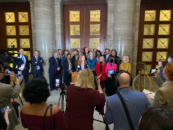Stop me if you’ve heard this one before. A small government program dreamed up in Washington D.C., to help aid a vulnerable population grows unchecked into a massive, anti-free market entitlement, which instead of being reformed eventually trickles down to state governments thanks to special interests.
That’s exactly what the hospital lobby, with the help of the Biden administration and liberal advocates, is looking to do in Arkansas, Kansas, and other Midwest states — with Missouri next on their target list.
In 1992, Congress created the 340B prescription drug discount program, which mandates that drug companies sell products at 25 percent to 50 percent discount to select safety-net hospitals and clinics that primarily serve low-income or uninsured populations, like federally qualified health centers and disproportionate share hospitals. The discounts are meant to be passed down to the most vulnerable patients to help make prescription drugs more affordable.
Hospitals and clinics make money off this program because insurance reimbursements are usually higher than their 340B discount costs. Unfortunately, nothing requires hospitals to disclose how they use these savings, including how much of it is passed onto patients, versus padding the bottom line. They also can contract with outside pharmacies to scoop up more of these discounts.
Calls to reform or bring more transparency or reporting to this unusual arrangement where the federal government forces one private company — if they want their drugs covered by Medicaid or Medicare Part B — to sell a product at a discount to another company have so far been unsuccessful.
Instead, the hospital lobby is putting its political muscle behind greatly expanding which entities can access these deep discounts. In 2021, the hospital lobby convinced Arkansas to pass a state law, House Bill 1881, greatly expanding how many entities can access these profitable discounts. That new law is now tied up in litigation in federal courts.
Likewise, legislative hearings in Kansas show hospitals have made greatly expanding this federal program in the Jayhawk state a top priority.
From 2000 to 2020, the number of providers participating in the program already jumped from 8,100 to 50,000, according to a new study from the University of Southern California. The total amount of drugs purchased under the 340B program jumped from $4 billion annually in 2007-2009 to $38 billion in 2020. Yet, the amount of charity care that U.S. hospitals provided actually decreased from 2012-2020.
The USC study also found that “hospitals that began participating in the 340B program after 2004 are more likely to serve wealthier and more insured populations, which is counter to the original intent of 340B savings being used to support care for vulnerable populations.”
Fresh off their victory in convincing liberal Missouri courts to unilaterally implement Medicaid expansion, despite lawmakers not funding the costly program, Missouri hospitals are pushing 340B legislation in Missouri this legislative session. Conservative Missouri legislators should turn back this effort.
Liberals always want to frame these public policy issues as simply one special interest group fighting another. They cynically believe if lawmakers simply see this as Big Hospitals versus Big Pharma, it will obscure the fact that government is controlling more and more of our health care system with each passing year.
If the Biden administration won’t slow the growth of this runaway entitled program, then the last thing Missouri lawmakers should do is aid and abet these efforts.
Many Republican lawmakers and candidates have recently run on the platform of pushing back against federal mandates and anti-free market federal excesses. Whether it’s this 340B program or whatever new entitlements Nancy Pelosi, Chuck Schumer, and Joe Biden dream up, the time for truly standing up and putting those words into action is now.

Carl Bearden is the CEO of United for Missouri, a leading grassroots advocacy organization dedicated to the American free enterprise system and a watchdog against government that exceeds its intended functions and limits.













